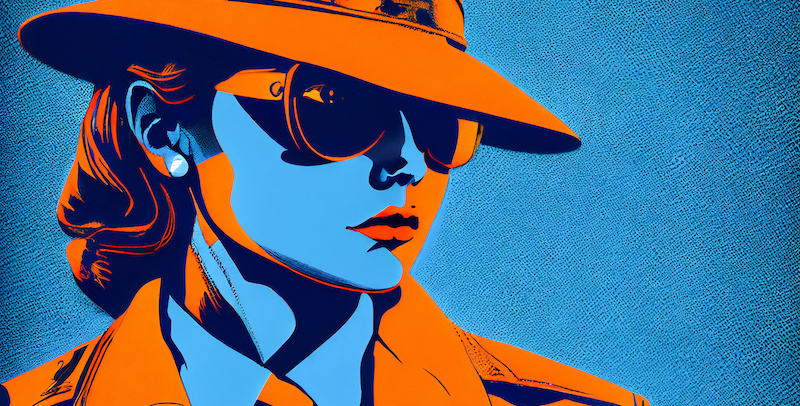On February 24th, 2022—a week after I’d submitted the first draft of my Soviet spy thriller, Black Wolf, to my publisher—the world watched in dismay as Russian troops occupied the Chernobyl nuclear plant in Ukraine. While the alarming specter of a wider nuclear attack loomed, raised once again by our old Cold War enemy, Russia, I also wondered how many of the thousand Russian soldiers I was seeing retreat through the Exclusion Zone would eventually die, slowly and painfully, because of their exposure to the radioactive soil.
In some ways, the fact that I’ve managed to become an author at all is surprising. Despite being born in the early 1950’s, I’d stubbornly, and steadfastly, resisted the role of conventional femininity from a young age. In the era of the crinoline skirt and white patent leather shoes, the feminine ideal at the time being June Cleaver or Donna Reed, I was the daughter who went hunting with her dad, rode horse-back in the mountains, strung wire fences on our thirty-acre farm, and helped dig postholes.
Until the day he died, my dad told me I could do anything I wanted; I’d just have to work three times harder than a man to get there. He once said there was only one thing that I, as a woman, couldn’t do like a man: lie with a straight face. In this, I would later prove him wrong—learning the art of misdirection and covert strategies alongside my male colleagues in the Former Soviet Union—but when I was younger, I let his words fuel my ambition.
I moved to New York after finishing college and began working at a brokerage firm for the Commodity Exchange’s former chairman in 1980—truly the Wild, Wild West of Manhattan. Starting as office manager, I worked my way up to operations manager, often in meetings with corporate attorneys, bankers, big money investors, and political figures, famous and infamous. More often than not, I was the only woman in the room. Until the 1990’s, there were almost no women on the trading floor; most women could only hope to work as analysts or trading clerks.
After leaving the commodities business 1990, I began working for a U.S. company bringing former Soviet technology to the United States. This was soon after the happy delirium of the Berlin Wall coming down and the former Soviet republics initiating independence. The U.S. government, with hair-raising awareness, and despite the warming effects of glasnost, noted that the Soviet Union still had, collectively, over ten thousand strategic nuclear warheads. Intelligence agencies began reporting that some of the nuclear silos were unmanned, the enriched radioactive materials stored in facilities secured only with a padlock.
Thanks to our government and scientific contacts in Byelorussia (now Belarus), our company was contracted to a new Senate mandated initiative: the Nunn-Lugar Cooperative Threat Reduction (CTR) program. Our job, under the direction of the Department of Defense, was to assist in the dismantlement of weapons of mass destruction. From the start, I was made aware of what was at stake: Iran and Pakistan were actively seeking to obtain these weapons at any cost. Anyone with enough cash could buy a nuclear bomb. The NSA, the CIA and the Pentagon were all listening very intently to the constantly changing winds coming from the crumbling Soviet Union. The intelligence game, on both sides, was still being played in the shadows.
Most people are familiar with the fictional world of spies: danger at every turn, a gun with a silencer, an accomplished seducer, the tightening garrote around a naked throat. And female spies in novels and films are often cast as either a victim needing to be rescued, or as a cunning Mati Hari using her feminine wiles to extract information. In the real world, spy craft is much more mundane, and, once again, I found myself the sole female member of our team. In my job there was quite a bit of waiting, and listening, and reportage. I did mountains of status reports during the years I spent working as a defense contractor.
But there were certainly dangerous assignments in unstable parts of the world, which is part of what I wanted to capture in Black Wolf. Moscow, in particular, had become a hotbed of Russian Mafia kidnappings for ransom in the early 1990’s, so I never traveled anywhere alone in the Former Soviet Union. I felt fortunate to be relatively safe as an American working in the newly sovereign republic of Byelorussia (eager to be a beneficiary of congressional aid). It was a daily battle as a female project manager, though, to garner cooperation from my Soviet male counterparts. The Glorious Revolution, in theory, elevated the status of Russian women in the sciences and in manufacturing. But the inferior social status of women continued unabated. It was the women who were expected to make and serve tea to foreign guests and clean up afterwards. Often during social situations (even during embassy functions), I witnessed harassment and inappropriate touching of the female guests.
In many ways I think I confounded my Soviet colleagues. During business hours Russian women always wore dresses; I wore pantsuits. Russian women were expected to be docile and subservient; I certainly was not. I’d built my resilience on the floor of the roiling, boisterous commodity exchange in New York City where most of the young Turks of the trading world were smart-mouthed, aggressive guys from the streets of Brooklyn and Staten Island. I’d learned to stand up for myself and eventually earned their grudging respect. There were times when I literally stood toe to toe with a Soviet counterpart, refusing to be belittled, bullied, or dismissed.
On occasion, when the bullying didn’t work, there would be dark, veiled threats of being turned over to the internal security agency for an “interview”. But surprisingly, our KGB minders most often appeared friendly, even cheerful at times. One of their favorite jokes to tell Americans was, “Why is KGB headquarters the tallest building in Minsk? Because from the top floor you can see all the way to Siberia!”
During the early 1990’s in Byelorussia, I knew without a doubt that I would be constantly watched and reported on by the KGB. My phones would be tapped, my every move recorded. But the terror, for me, was not of being arrested and detained by the KGB. My greatest fear was of a more insidious kind: that at some point I, or one of my colleagues, would succumb to the effects of long-term exposure to the toxic environment. The explosion at Chernobyl in 1986 had poisoned over 70% of Byelorussia. The Exclusion Zone, the southernmost border with Ukraine, would be toxic for thousands of years. The rate of cancer, especially thyroid cancer, and birth defects in Byelorussia had increased exponentially since 1986.
I remember waking up in my hotel room (the same Planeta Hotel as in Black Wolf), in a full-blown panic attack, my heart pounding, drenched in a fever sweat. But these things were never openly discussed by my male colleagues, even though the Chernobyl radiation maps provided by the U.S. government showed vastly greater irradiated tracts of land than the Soviet issued maps. Common among my male colleagues, especially those with the DoD, was a stoic, wait and see approach. I don’t remember ever sharing my concerns with anyone until much, much later. Misplaced or not, I believe the consensus, especially among the civilian contractors, was that our government would not intentionally place us in any unnecessary harm.
I would end up working inside the Former Soviet Union (Belarus and Kazakhstan) for almost a decade. And during that time most, if not all, of my colleagues—from my U.S. partners, the State Department, the Department of Defense, and most assuredly amongst our Soviet counterparts—would be men. Over the past thirty years the percentage of women contracted to the DoD has risen to about thirty-five percent. In the early 1990’s, that number was negligible. For the most part, I had a comfortable working relationship with the younger men from the State Department and the DoD. But I would often be discounted, insulted, or ignored by men of a certain age: those men who had lived through the hyper-masculinized maneuverings of the Cold War. But the harder my male counterparts resisted or undermined my efforts as program manager, the more determined I became to succeed. Much as digging post holes through rocky, dense soil builds strength.
***


















